Many experienced GOP strategists unwilling to work for Donald Trump

Donald Trump has finally acknowledged that to best compete against Hillary Clinton he needs more than the bare-bones campaign team that led him to primary success. But many of the most experienced Republican political advisers aren’t willing to work for him. From Texas to New Hampshire, well-respected members of the Republican Party’s professional class say they cannot look past their deep personal and professional reservations about the presumptive presidential nominee. While there are exceptions, many strategists who best understand the mechanics of presidential politics fear that taking a Trump paycheck might stain their resumes, spook other clients and even cause problems at home. They also are reluctant to devote months to a divisive candidate whose campaign has been plagued by infighting and disorganization. “Right now I feel no obligation to lift a finger to help Donald Trump,” said Brent Swander, an Ohio-based operative who has coordinated nationwide logistics for Republican presidential campaigns dating to George W. Bush. “Everything that we’re taught as children — not to bully, not to demean, to treat others with respect — everything we’re taught as children is the exact opposite of what the Republican nominee is doing. How do you work for somebody like that? What would I tell my family?” Swander said. Trump leapt into presidential politics with a small group of aides, some drafted directly from his real estate business, with no experience running a White House campaign. An unquestioned success in the GOP primaries, they have struggled to respond to the increased demands of a general election. As in years past, the primary season created a pool of battle-tested staffers who worked for other candidates, from which Trump would be expected to draw. But hundreds of such aides have so far declined invitations to work for him. They include several communications aides to Chris Christie, as well as the New Jersey governor’s senior political adviser, Michael DuHaime, who has rejected direct and indirect inquiries to sign on with the billionaire. Chris Wilson, a senior aide to Ted Cruz, said the Texas senator’s entire paid staff of more than 150 ignored encouragement from Trump’s team to apply for positions after Cruz quit the presidential race. Wilson said that even now, many unemployed Cruz aides are refusing to work for the man who called their former boss “Lyin’ Ted.” That’s the case for Scott Smith, a Texas-based operative who traveled the country planning events for Cruz, and earlier worked on presidential bids for Bush and Texas Gov. Rick Perry. “It’s very clear that none of us are going to work for Trump,” Smith said. “Even if I wanted to work for Trump, my wife would kill me.” Smith, like many experienced strategists interviewed for this story, noted the intense personal sacrifice required of presidential campaigns. Many advisers do not see their families for long stretches, work brutal hours on little sleep and enjoy no job security. With Trump, Smith said, “I would feel like a mercenary. I can’t be away from my young children if it’s just for money.” Trump’s need for additional staff is acute. His paltry fundraising network brought in less than $2 million last month. He has just one paid staffer to handle hundreds of daily media requests and only a few operatives in battleground states devoted to his White House bid. Last month, Trump fired Rick Wiley, who was the campaign manager for Wisconsin Gov. Scott Walker, a former 2016 candidate, and was brought on to run Trump’s nationwide get-out-the-vote effort. On Monday, Trump fired campaign manager Corey Lewandowski, who acknowledged he lacked the experience needed to expand Trump’s operation. “This campaign needs to grow rapidly,” Lewandowski told the Fox News Channel. “That’s a hard job and candidly I’ve never grown something that big.” Trump credited Lewandowski with helping “a small, beautiful, well-unified campaign” during the primary season. “I think it’s time now for a different kind of a campaign,” Trump told Fox. Campaign spokeswoman Hope Hicks did not respond to multiple requests for comment about the campaign’s hiring. A former adviser, Barry Bennett, played down any staffing challenges, suggesting the campaign should be able to double its contingent by the party’s national convention next month. Trump announced four new hires in the past week, including a human resources chief to help with hiring, to supplement a staff of about 70. That’s compared with Clinton’s paid presence of roughly 700, many of them well-versed in modern political strategy. Trump’s senior team, including campaign chief Paul Manafort and newly hired political director Jim Murphy, largely represent an older generation of political hands more active in the 1980s and 1990s. The campaign’s new Ohio director, Bob Paduchik, led state efforts for Bush’s 2000 and 2004 campaigns. A new generation of top talent active in more recent years has shown little interest in Trump. In Iowa, experienced operative Sara Craig says she will not work for Trump or even support him. “I am more interested in working on down-ballot races,” said Craig, who helped elect Joni Ernst to the Senate from Iowa and directed a pro-Bush super political action committee. Ryan Williams, who worked on Mitt Romney‘s presidential campaigns, said he’s happy working for a consulting firm, where he’s involved with various other elections across the country, as well as with corporate clients. “When you sign up for a campaign, you’re putting your name on the effort. Some of the things that Trump has said publicly are very hard for people to get behind,” Williams said. But Paduchik offered the kind of positive perspective expected of a campaign on the move. “It’s been great, the response I’ve gotten,” Paduchik said. “Republicans in every corner of Ohio are excited about Mr. Trump’s campaign.” Republished with permission of The Associated Press.
House Speaker Paul Ryan says he’s voting for Donald Trump
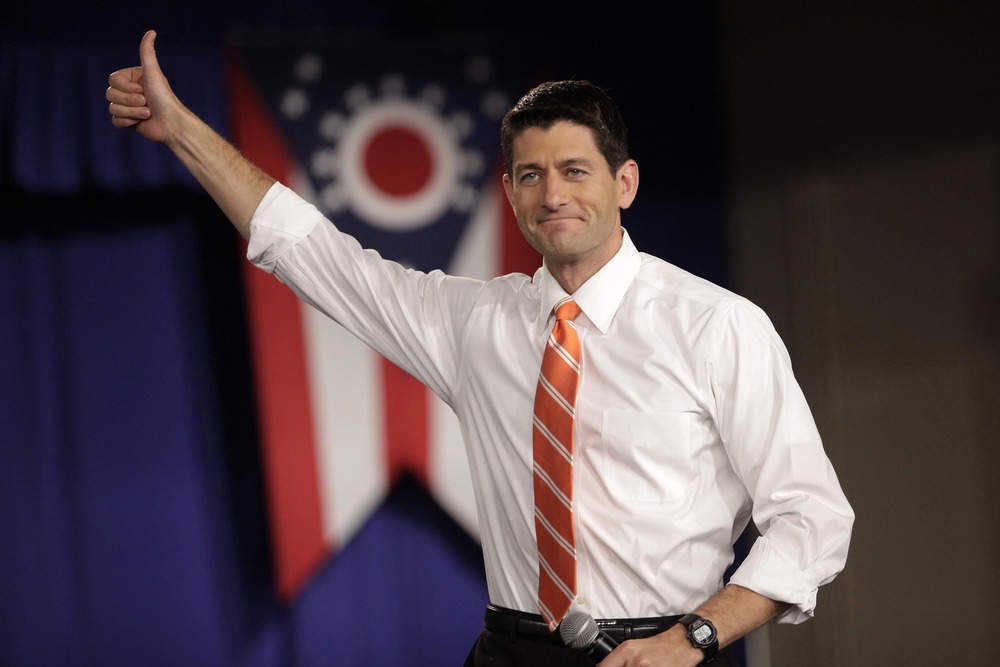
House Speaker Paul Ryan endorsed Donald Trump on Thursday, ending an extraordinary public split between the GOP’s presumptive presidential nominee and the nation’s highest-ranking Republican office holder. Ryan outlined his support for the New York billionaire in a column published in his hometown newspaper, declaring his goal to “unite the party so we can win in the fall.” “It’s no secret that he and I have our differences. I won’t pretend otherwise,” Ryan wrote. “And when I feel the need to, I’ll continue to speak my mind. But the reality is, on the issues that make up our agenda, we have more common ground than disagreement.” Trump, Ryan said, “would help us turn the ideas in this agenda into laws to help improve people’s lives. That’s why I’ll be voting for him this fall.” While Ryan did not explicitly say he was endorsing Trump, spokesman Brendan Buck wrote on Twitter that the column marked a formal endorsement. Ryan shocked the political world last month by refusing to endorse Trump once the real estate mogul became the last major Republican presidential contender still in the race. The pair spoke privately in a series of Washington meetings last month and their campaigns have maintained contact. The endorsement comes despite major differences on policy between the high-profile Republicans. Ryan has embraced reforms to Medicare and Social Security as his signature policy fight on Capitol Hill. Most Republicans in Congress have followed Ryan’s lead to reduce the cost of the popular programs that are contributing to the national debt. Trump has repeatedly promised not to cut the popular programs, echoing a position more commonly adopted by Democrats. Ryan’s announcement was released as Democratic front-runner Hillary Clinton was delivering a foreign policy speech excoriating Trump’s foreign policy. Republished with permission of The Associated Press.
Darryl Paulson: It’s now or never for #NeverTrump
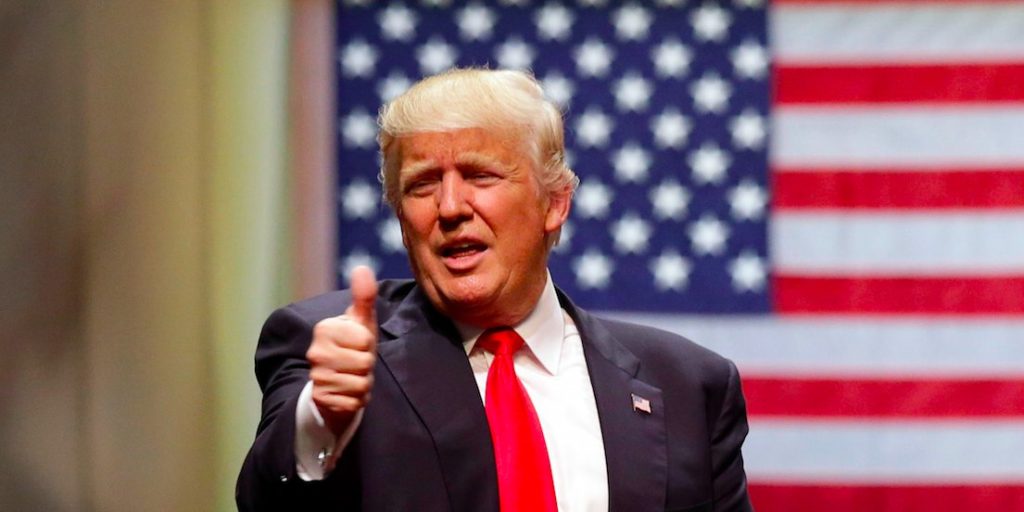
The opposition to Donald Trump has been constant from the start of the 2016 presidential campaign. However, it has been unfocused and essentially leaderless. Many Trump opponents believed he would not enter the race. When he entered, they believed he had no chance of winning. Now that Trump has won the nomination, they believe he can be stopped by an independent or third party campaign. As early as December 2015, before the first caucus or primary, Mike Fernandez, a Coral Gables, Florida health care executive and financial backer of Jeb Bush, took out full-page ads in the Miami Herald and other newspapers stating that he would support Hillary Clinton over Donald Trump. Fernandez described Trump as a narcissistic ”Bullyionaire” with a hunger to be adored. Fernandez was critical of fellow Republicans “blinded by the demagoguery” of Trump. In January 2016, National Review devoted an issue to conservative writers who made the case that Trump was not a conservative, and his nomination would do long-term damage to conservatism and the Republican Party. The issue contributed to the formation of the #NeverTrump movement, but it failed to stop Trump from winning the GOP nomination. With Trump having secured the nomination, many Republicans now look at the race as a binary choice: Donald Trump or Hillary Clinton. Most Republicans, unlike Mike Fernandez, see Trump as the preferred option. Foster Friess, a Wyoming financier and supporter of Republican candidates and causes, said Trump was not his first choice, but “he’s better than Hillary.” During the presidential primaries, even Jeb Bush stated that “Anybody is better than Hilary.” Some of Trump’s strongest critics have now jumped aboard the bandwagon. Texas Governor Rick Perry, who called Trump a “cancer” on the GOP who would lead the party to “Perdition,” has now offered to help Trump win the election. Oh, by the way, he would also be interested in being Trump’s Vice President. Many Republicans believe it is now a question of party loyalty. As Republican strategist Ford O’Connell observes, “political parties are not meant to be ideological vessels, but competing enterprises whose job is to win elections.” Rick Wilson, one of the most vehement anti-Trumpers, described the party loyalty argument as nothing more than “the DC establishment rolling over and becoming the Vichy Republicans we all know they would.” The last hope of the #NeverTrump movement is recruiting an independent or third-party candidate to provide an alternative to Trump and Clinton. RNC Chair Reince Priebus calls such efforts a “suicide mission.” Supporters argue that an independent candidate would not only give discontented voters a choice, but they believe such a candidate could win. At the very least, such a candidate could siphon off enough electoral votes to throw the election into the House, where the Republican majority could select someone other than Trump or Clinton. Supporters of an independent option argue that recent polls show 58 percent of voters are not happy with their choices, and 55 percent say they support an independent candidate. Historically, the idea of an independent candidate is more appealing than the reality. Teddy Roosevelt and his Bull Moose Party is widely regarded the most effective third-party movement. Roosevelt actually came in second and swamped incumbent Republican President William Howard Taft. Roosevelt received 27.4 percent of the vote and 88 electoral votes to only 23.2 percent and 8 electoral votes for Taft. In 1948, Governor Strom Thurmond of South Carolina won only 2.4 percent of the national vote but, because it was concentrated in a few Deep South states where Truman’s name did not appear on the ballot, Thurmond captured the electoral votes of four states. Twenty years later, Governor George Wallace replicated much of Thurmond’s success in winning 13.5 percent of the vote and 46 electoral votes in five southern states. In 1992, Texas businessman Ross Perot and his Reform Party won almost one out of five votes, but failed to capture a single state. At one point, Perot led both George H. W. Bush and Bill Clinton but, as Election Day approached, many of his supporters returned to support their traditional party. To run as an independent or third-party candidate, there is one important requirement: you need a candidate. So far, the #NeverTrump movement has not found a willing person to oppose Trump. Among the possible candidates are Mitt Romney, the 2012 Republican presidential nominee. Romney has name recognition and money, and would likely qualify for the debates. Romney was opposed by many conservatives in his 2012 race which would once again be a problem. In addition, Romney’s enthusiastic acceptance of Trump’s endorsement in that campaign would be another concern. Marine Corps General James Mattis seriously considered running before backing out. Mattis would have commanded support as a military figure and a political outsider. But, Mattis is not an Eisenhower and is an unknown commodity. Marco Rubio‘s name is being tossed about as a possible candidate. Rubio is young, charismatic and has appealed to woman and minority voters. The downside is that Rubio won only in Puerto Rico, Minnesota and the District of Columbia, and badly lost his home state of Florida to Trump. In addition, Rubio signed the pledge to support the Republican nominee “and I intend to keep it.” Ben Sasse, a first-term Republican Senator from Nebraska, has been a leader in the #NeverTrump movement. Sasse is only in his second year as a senator, which will raise questions about his experience. He also is unknown outside of Nebraska. Finally, former House member and Senator Tom Colburn has expressed interest in running and is highly respected by conservatives for his attempts to cut federal spending. Colburn has stated that Trump “needs to be stopped,” but recently said he would not be the candidate. One of the maxims of politics is that it takes something to beat nothing. So far, nothing looks like he has the race all wrapped up. ___ Darryl Paulson is Professor Emeritus of Government at USF St. Petersburg.
Kay Ivey named one of the ’50 Most Influential Female Republicans’ in America
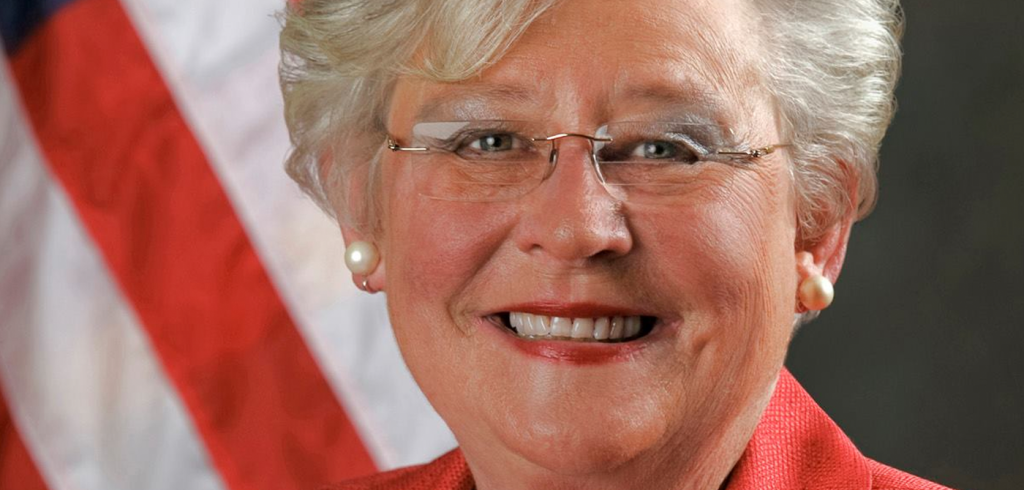
In what is easily the most-talked about election in history, the political landscape of the Republican Party continues to shift. And despite the Democratic Party‘s accusations of so-called “war on women, an increasing number of strong, well-educated women emerge into leadership roles of the GOP. Among those notable female leaders — Alabama’s own Lt. Gov. Kay Ivey, who was on Thursday named to the national, conservative website Newsmax’s 2016 list of the 50 Most Influential Female Republicans. Comprised of women “who will play a key role in shaping America’s future” the list features others including No. 1, former Alaska governor and Vice-Presidential nominee Sarah Palin, No. 3, best-selling conservative author Laura Ingraham, No. 14, former candidate for the Republican nomination for president Carly Fiorina, and No. 39, former Secretary of State Condoleezza Rice (another Alabama native). “It is truly an honor to be included in Newsmax’s 50 Most Influential Female Republicans,” Ivey said of her inclusion on the list. “I am humbled to join the prestigious list of hardworking Republican women from across the Nation. I am most proud to have the opportunity to serve and represent the people of this great State.” In 2002, Kay became the first Republican elected State Treasurer since Reconstruction and was re-elected in 2006. As Treasurer, Kay was committed to making the office more open, transparent, and efficient. She made history yet again in 2010 when she was elected the first Republican woman Lieutenant Governor in Alabama’s history, and repeated the feat when re-elected in 2014.
Poll: Americans have an unfavorable view of the GOP
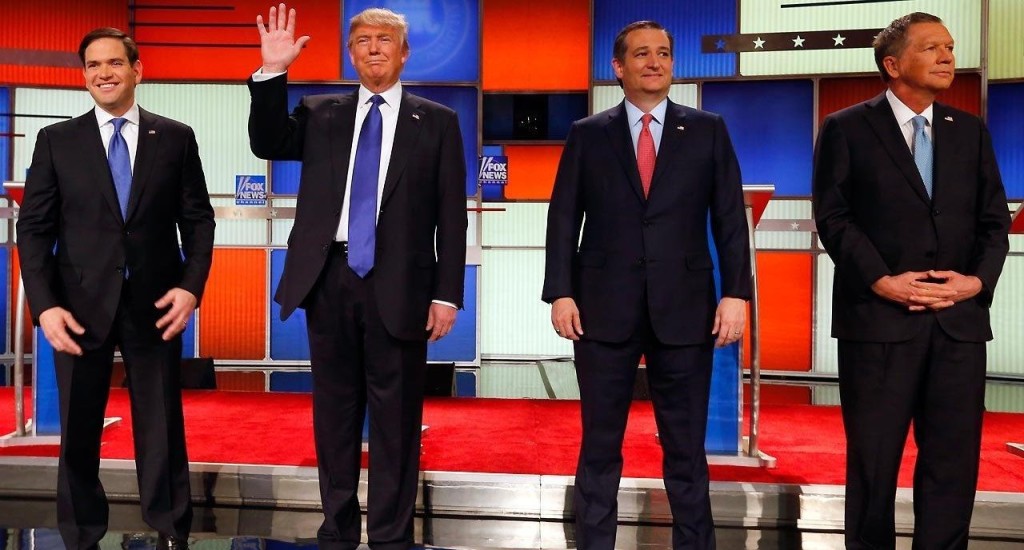
The Republican Party may have an image problem. According to a report by the Pew Research Center, 62 percent of Americans have an unfavorable view of the Republican Party. That’s up since October, when 58 percent of people said they had an unfavorable view of the GOP. The survey found 33 percent of the public has a favorable impression of the Republican Party. When it comes to the Democratic Party, 50 percent of adults said they had an unfavorable opinion of the party; while 45 percent of adults said they had a favorable opinion. The national survey of 2,008 adults found Democrats had a far more favorable impression of their party than Republicans. The study found 88 percent of Democrats viewed their party favorably, while 68 percent of Republicans had a favorable opinion of their party. When it comes to independents, 28 percent have a favorable opinion of the GOP. Of those independents who consider themselves Republican-leaning, 50 percent have a negative view of the party. The survey, conducted April 12 through April 19, found that 37 percent of independents had a favorable impression of the Democratic Party; while 63 percent of Democratic-leaning independents had a favorable view of the Democratic Party. “Overall, a quarter of the public now expresses unfavorable opinions of both political parties,” the report said. “This is driven in part by the growing share of Republicans and Republican leaners who view the GOP negatively, and by the overwhelming shares in both parties who view the opposing party unfavorably.” According to the report, the negative ratings in both parties are “higher today than in previous presidential election years.” Seven percent of adults had unfavorable opinions of both parties in 2000; while 18 percent of adults viewed the parties unfavorably in 2012.
Darryl Paulson: The rise and fall of Marco Rubio
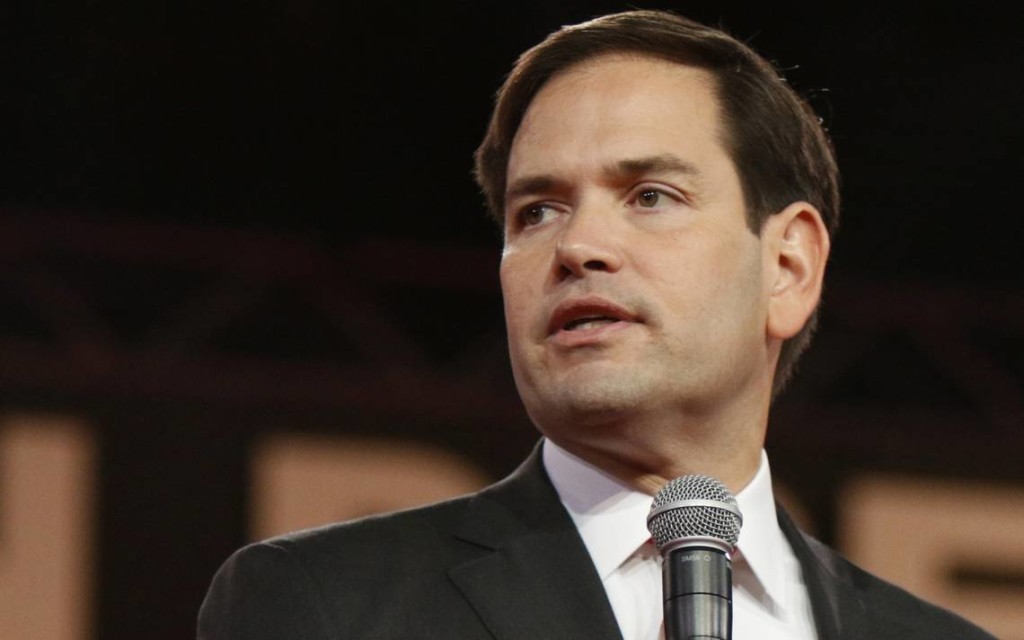
Marco Rubio has had a meteoric political career. From winning a seat on the West Miami City Council in the 1990s, to winning a special election by 64 votes to earn a seat in the Florida House, to his stunning victory over Republican Gov. Charlie Crist in the 2010 U.S. Senate race, Rubio’s political career has been impressive. When Rubio challenged the popular Crist for the Republican nomination to the U.S. Senate, most pundits said he didn’t have a chance. Crist had the support of the Republican establishment in Florida and also the support of the Republican Senatorial Campaign Committee. Rubio started the race trailing Crist by anywhere between 30 to 45 percent. Rubio, playing the role of the biblical David to perfection, defeated the Goliath Crist. In what I consider the most astounding election in modern Florida history, Rubio chased Crist from the Republican Party and forced him to run as an independent candidate. On Election Day, Rubio won 49 percent of the vote to 30 percent for Crist and only 20 percent for Democrat Kendrick Meek. The giant had been slain, and Rubio would soon be branded by Time magazine as “the Republican savior.” After losing the 2012 presidential election, the Republican Party created a “Growth and Opportunity Program” to analyze the results and develop a path forward. Essentially, the committee recommended that the party had to broaden its appeal to women and minorities, especially Hispanics, if they hoped to win the White House. They could no longer win with just white, male voters. Many Republicans viewed Rubio as the future face of the party. Young, articulate, conservative and Hispanic, he was the ideal candidate. In April 2015, Rubio announced his campaign for the presidency. He was one of 17 Republican candidates and was consider one of the front-runners. Rubio turned out to be one of the great political underachievers in modern politics. He won only three of the 32 primaries and caucuses, winning Minnesota, Puerto Rico and the District of Columbia. Tea Party voters who carried him into the U.S. Senate in 2010 deserted him in the presidential campaign. “America is in the middle of a real political storm, a real tsunami, and we should have seen this coming,” Rubio said in his concession speech. Donald Trump destroyed Rubio in his home state where Rubio had never lost an election. Trump got 45.7 percent of the vote; Rubio got only 27 percent. Trump won 66 of Florida’s 67 counties. The only county Rubio won was his home county of Miami-Dade. All of Florida’s 99 delegates were awarded to Trump. Not only did Rubio get trounced, but Trump also laid to rest the myth that he could not win in a closed primary state. It was the Republican voters of Florida who said yes to Trump and no to Rubio. What went wrong for Rubio? Among the many explanations is Rubio’s role as a member of “the gang of 8” who pushed for immigration reform and a pathway for citizenship for illegal aliens. There is some truth to this, but among Florida’s primary voters, only 12 percent mentioned immigration as a major factor in their vote. Others cited Rubio’s devastating performance in the New Hampshire debate where Chris Christie accused Rubio of being a robotic, scripted candidate who merely repeated his 25-second talking points. Rubio repeated the same talking point three times during the debate. He finished in fifth place in New Hampshire. Rubio’s campaign was widely criticized for its reliance on a media-focused approach. As his campaign manager, Terry Sullivan, told the New York Times: “More people in Iowa see Marco on ‘Fox and Friends’ than see Marco when he is in Iowa.” However, numerous studies demonstrate that a solid ground game can produce a voter boost of up to 10 percent on Election Day and a good telephone effort can add another 4 percent. Finally, many believe Rubio delivered the wrong message at the wrong time. He alluded to this in his concession speech when he said, “this may not have been the year for a hopeful and optimistic message.” Republican voters wanted someone to channel their anger into reforming politics and solving problems. March 15 was the Ides of March. To paraphrase Marc Antony, “I come to bury Marco, not to praise him.” *** Darryl Paulson, Emeritus Professor of Government, USF St. Petersburg.
Ben Pollara: A Democrat’s unsolicited advice for the GOP that created Donald Trump
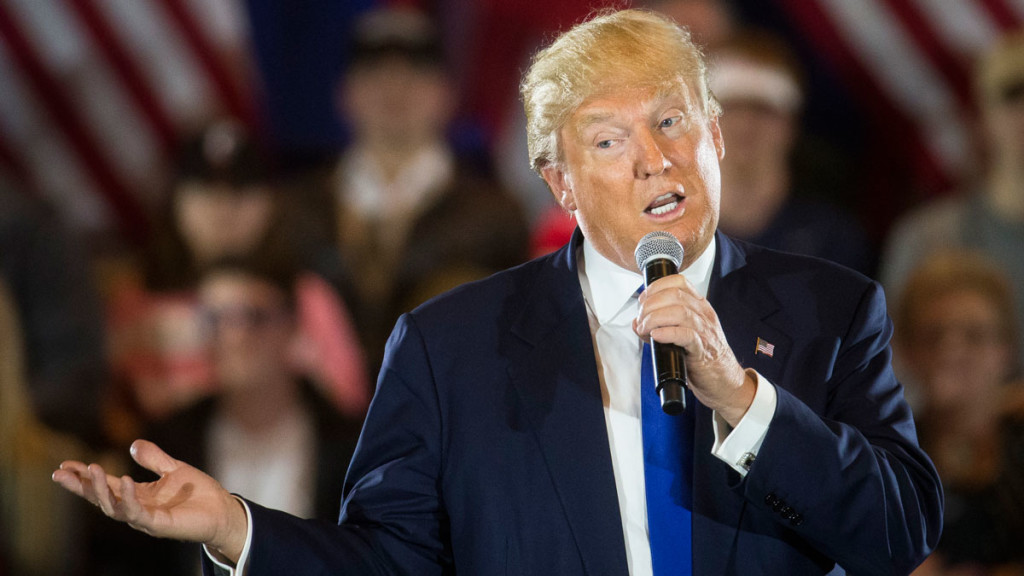
What is more appealing for Democrats like me? Donald Trump as the Republican nominee, or a fractured convention that produces a nominee who received no Republican primary votes, like Paul Ryan? Honestly, both sound pretty good and likely to culminate in a Hillary Clinton presidency. But it’s not up to Democrats like me, and the questions Republicans should be asking themselves have more serious consequences for both their party and our system of governance. Beyond my partisanship, I hold a core belief in the essential function of the two-party system and the imperfect, yet better than the alternatives, manner in which it maintains the values of our republican democracy. Assuming Trump enters Cleveland with a plurality but not majority of delegates, to deny him the nomination would shatter the Republican Party for a decade to come, and with it the two-party system that balances the most extreme tendencies of American political ideology. The media reacted with shock at Trump’s assertion that a brokered convention that denied him the nomination would lead to rioting. Trump has said many outrageous things, many of them without basis in fact. This was not one of them. Just as Vietnam and Civil Rights nearly tore apart the Democratic Party in 1968, denying Trump the nomination through Byzantine delegate rules would succeed in doing the same to the Grand Old Party. The party of Lincoln must come to terms with the reality that it now holds that moniker by historical fact only. The Republican Party has, by virtue of a political strategy to build a winning national coalition post-New Deal, become the party of Richard Nixon, Ronald Reagan, and yes, Donald Trump. To survive, Republicans must face down that which they have wrought through two generations of “dog whistle” racism and us-vs-them fearmongering that, until recently, served the cynical corporatists and political elites in the party quite well. The Southern Strategy and the rise of fundamentalist religious extremism paved the way for the K Street Project and 20 of 28 years of Republican White House occupancy; the Tea Party and Birtherism gave rise to the Koch-era and hegemony of the legislative branch in D.C. and most state capitols. But the craven decisions that led to these triumphs are causing the Republican Party to collapse under the weight of its own base. What fueled government shutdowns over previously benign issues like raising the debt ceiling and funding Planned Parenthood (and the ultimate ouster of John Boehner as Speaker of the House) is precisely what is fueling Donald Trump’s success. It is willful ignorance and intellectual dishonesty of the first degree for Republicans to bemoan the “Make American Great Again” movement and its accompanying rhetoric of angry xenophobia without owning responsibility for creating the environment that spawned it. You reap what you sow. Give Trump the nomination he has earned; you fostered the environment that incubated him. Let Trump fail spectacularly in November. Then look in the mirror and begin to rebuild the Republican Party in the image of Abraham Lincoln, rather than David Duke and his ilk. The alternative is a splintering of the very foundation of our political system and a generation of Democratic hegemony, which may have pundits in the not distant future bemoaning that “Barack Obama wouldn’t have been able to win a single state’s primary in today’s Democratic Party. He was basically a Republican.” Republicans should ask themselves, what is scarier? Four more years of a Democrat in the White House, or a future where that statement is true? • • • Ben Pollara is a political consultant and a founding partner of LSN Partners, a Miami Beach-based government and public affairs firm. He runs United for Care, the Florida medical marijuana campaign and is a self-described “hyper-partisan” Democrat.
Viewer’s Guide: GOP debate about Donald Trump vs. everyone else

And then there were four. Ben Carson‘s departure from the GOP presidential race means the quartet of remaining Republicans on the debate stage Thursday night get more time for attacks as Donald Trump treads a path to the GOP nomination and his three rivals try to trip him up. Cheered on by many Republican leaders, Ted Cruz, Marco Rubio and John Kasich are racing the primary clock to March 15, likely their last chance to stop Trump in a series of winner-take-all contests. Some things to watch Thursday night as the candidates meet at 9 p.m. EST for the Fox News Channel debate in Detroit: HE WHO WAS NOT NAMED Love him or loathe him, Trump has taught the poohbahs of the Republican Party what a power grab really is — and he’s done it by winning over large swaths of the GOP’s own core supporters far from Washington. His wobbling over whether to disavow the support of former Ku Klux Klan leader David Duke finally gave the Republican leaders of Congress a way to go after the billionaire publicly — without uttering Trump’s name. Trump responded by saying House Speaker Paul Ryan would have to get along with a President Trump or pay some sort of “big price.” On the eve of the debate, Ryan’s office confirmed that Trump’s campaign had contacted the speaker’s staff in a first sign of outreach. Notably, Trump has started talking about unifying the GOP. Look for Trump to be asked about the existential rift in the party and how he expects to govern. ___ RUBIO, RUDE? TRUMP, TOO? The Florida senator who once insisted on staying above the scuffling has leapt right into it, emulating Trump’s schoolyard-taunting style. At campaign events in the past week, Rubio made sometimes crude jokes about everything from Trump’s tan to the size of his hands — he even suggested that the billionaire wet his pants at the last debate. Look for whether a newly confident Rubio, emboldened by his first primary win in Minnesota Tuesday, keeps it up or takes a more statesmanlike approach. And what to expect from Trump? “I can’t act overly presidential because I’m going to have people attacking from every side. A very good man, Ben Carson’s not there anymore, so now we’re going to have more time for the fighting,” he said. “When people are hitting you from different angles, from all different angles, unfortunately you have to hit back. I would have a very, very presidential demeanor when I win, but until such time, you have to hit back,” he told NBC on Thursday. ___ CRUZ’S STAND Thanks to Rubio’s win Tuesday, Cruz can no longer say he’s the only Republican who has shown he can beat Trump. But he won three states on Super Tuesday — Alaska, Oklahoma and his home state of Texas. And the delegate math shows that Cruz is emerging as the candidate who might stop Trump. Look for some confidence from Cruz, because on Super Tuesday alone he came close to Trump. For the night, Trump won at least 237 delegates and Cruz won at least 209. Rubio was a distant third with at least 94. Even Sen. Lindsey Graham, who a week earlier joked at a dinner about killing Cruz, acknowledged on CBS that the Texas senator might be the party’s best hope to beat Trump. ___ KASICH, STILL The debate setting is likely most helpful to Ohio Gov. John Kasich, who is looking for a strong showing in Michigan in the state’s March 8 contest, to survive. __ FOX AND TRUMP, FRENEMIES Trump has uttered barely a peep about the fact that Fox News Channel is hosting the debate, and that his sometime-nemesis Megyn Kelly, is one of the moderators. This is a marked change from the upheaval that led to Trump boycotting Fox’s debate just before the leadoff Iowa caucuses. Trump had demanded that Kelly be removed; Fox refused and Trump headed a few miles away to host his own event. He later said that could have been one of the reasons he lost Iowa to Cruz. Trump has not tweeted about Kelly in weeks. In an interview with the Associated Press this week, Kelly said she thinks Trump has more confidence now. “He knows he can handle me. He can handle any interviewer,” she said. ___ TRUMP UNIVERSITY How good is a degree from Trump University? “Worthless” — as are his promises — according to former GOP presidential nominee Mitt Romney. Romney will brand the billionaire businessman as “a phony, a fraud” in a Salt Lake City speech on Thursday, as party of a push by GOP establishment figures to paint the billionaire as unfit to represent the party. Trump should have a few things to say about it. He already started slugging on Thursday morning, saying that Romney “begged” him for his endorsement four years ago, and called him a “failed candidate.” ___ REMEMBER BEN CARSON? Kelly said he wouldn’t have gotten much attention even if he had stuck around for the debate. Fox will concentrate its questions on Trump, Cruz and Marco Rubio — making for potentially awkward moments for Kasich. Republished with permission of the Associated Press.
Racial feud erupts as Republicans fight ‘unstoppable’ Donald Trump
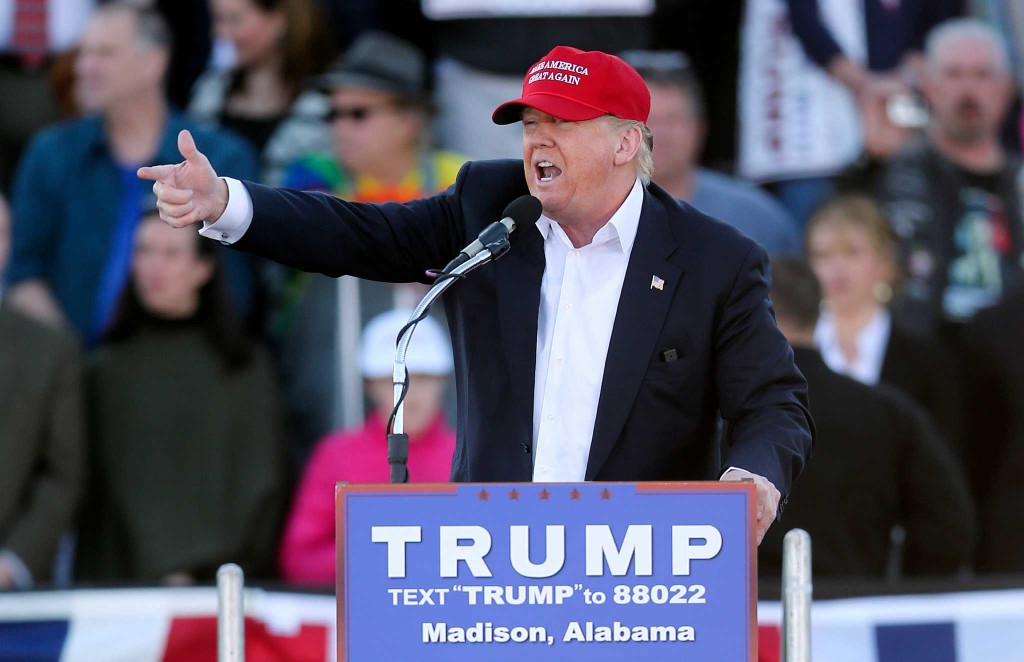
The final-days sprint to Super Tuesday has erupted into a feud over a white supremacist as Donald Trump‘s Republican rivals scramble to stop the billionaire businessman from becoming an “unstoppable” force in the 2016 presidential contest. Ted Cruz and Marco Rubio continued to hammer the GOP front-runner’s character and lack of policy specifics in a series of attacks Sunday while courting voters across the South. But it was Trump’s refusal to denounce an implicit endorsement from former Ku Klux Klan leader David Duke that dominated the narrative less than two days before Republican voters across 11 states head to the polls. The new focus comes as Trump’s rivals acknowledge that time is running out to prevent the former reality television host from becoming the Republican Party’s presumptive nominee. He took a new step in that direction by earning the endorsement of Alabama Sen. Jeff Sessions, a would-be Cruz ally who backed Trump instead. “There is no doubt that if Donald steam rolls through Super Tuesday, wins everywhere with big margins, that he may well be unstoppable,” Cruz said Sunday on CBS’ “Face the Nation.” Trump was asked Sunday on CNN’s “State of the Union” whether he rejected support from the former KKK Grand Dragon and other white supremacists after Duke told his radio followers this week that a vote against Trump was equivalent to “treason to your heritage.” “Well, just so you understand, I don’t know anything about David Duke. OK?” Trump told host Jake Tapper. “I don’t know anything about what you’re even talking about with white supremacy or white supremacists.” Cruz soon responded on Twitter, telling Trump: “You’re better than this. We should all agree, racism is wrong, KKK is abhorrent.” Rubio went further in a message to thousands of supporters in Leesburg, Virginia: “We cannot be a party who refuses to condemn white supremacists and the Ku Klux Klan,” Rubio said. “Not only is that wrong, it makes him unelectable. How are we going to grow the party if we nominate someone who doesn’t repudiate the Ku Klux Klan?” Trump was asked Friday by journalists how he felt about Duke’s support. He said he didn’t know anything about it and curtly said: “All right, I disavow, ok?” He hasn’t always claimed ignorance on Duke’s history. In 2000, he wrote a New York Times op-ed explaining why he abandoned the possibility of running for president on the Reform Party ticket. He wrote of an “underside” and “fringe element” of the party, concluding, “I leave the Reform Party to David Duke, Pat Buchanan and Lenora Fulani. That is not company I wish to keep.” Trump has won three of four early voting states, roiling a party divided over the prospect of the brash billionaire becoming its nominee. Late Sunday, Nebraska’s Ben Sasse became the first sitting Republican senator to say explicitly that he would not back Trump if he does win the nomination. “If Trump becomes the Republican nominee my expectation is that I’ll look for some 3rd candidate — a conservative option, a constitutionalist,” Sasse wrote on Twitter. The Duke debate seeped into the Democratic contest, as Vermont Sen. Bernie Sanders also lashed out on Twitter: “America’s first black president cannot and will not be succeeded by a hatemonger who refuses to condemn the KKK.” Asked about the issue on Monday, Trump said he had disavowed Duke and asked, “How many times do I have to continue to disavow people.” In a phone-in interview with NBC’s “Today” show, the real estate mogul was asked about earlier remarks in interviews where he had seemed to stop short of disavowing Duke. He said the questioner in the earlier interview had asked about Duke and various “other groups,” saying he had difficulty with an earpiece he was wearing for the phone-in interview and didn’t want to disavow groups whose identity he didn’t know. Trump also said he had clearly made separation with Duke over the weekend in posts on Twitter and Facebook. Hillary Clinton re-tweeted Sanders’ message. She scored a lopsided victory in South Carolina the day before, fueled by a huge advantage among African-Americans, a key Democratic constituency that will also play a dominant role in several Super Tuesday states. Clinton turned her attention to the Republican field, all-but-ignoring rival Sanders from campaign events in Tennessee on Sunday. Starting her morning with stops at two Memphis churches, Clinton offered an implicit critique of Trump, issuing a call to unite the nation and asking worshippers to reject “the demagoguery, the prejudice, the paranoia.” While she never explicitly mentioned Trump’s name, the comments referenced his campaign slogan, “Make America Great Again.” ”America has never stopped being great, our task is to make American whole,” said Clinton at Greater Imani Cathedral of Faith, prompting a chorus of “amens” from the crowd. The latest shake-up in the GOP race comes as attention shifts to the South, where the region will dominate on Super Tuesday — March 1 — and the weeks beyond. Trump holds commanding leads across the region, with the exception of Cruz’s home state of Texas, a dynamic that puts tremendous pressure on Rubio and Cruz as they try to outlast each other and derail Trump. Trump mocked the Republican establishment and his flailing rivals. “It’s amazing what’s going on,” he told NBC, calling his campaign a “movement.” Republished with permission of the Associated Press.
Jeb Bush upbraids Donald Trump at New Hampshire Republican forum
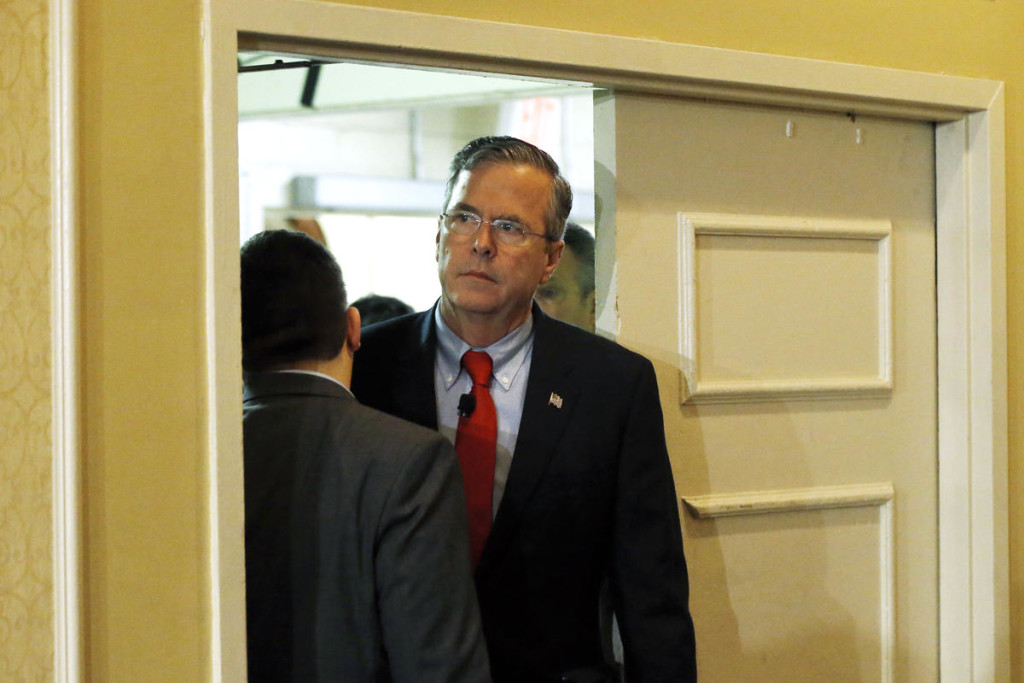
Former Florida Gov. Jeb Bush unleashed a fury of criticism against Donald Trump on Saturday before imploring New Hampshire voters to forgo the billionaire businessman in the state’s Feb. 9 primary. “You have a chance to reshape this whole primary,” Bush told hundreds of voters at a state Republican Party presidential candidate forum. Trump, who continues to dominate polling in the first primary state, did not attend the event. Nor did Texas Sen. Ted Cruz, who is neck-and-neck with Trump in first-to-nominate Iowa and rising in New Hampshire. A host of candidates fighting for survival in the 2016 race appeared alongside Bush. Among them: Florida Sen. Marco Rubio, Ohio Gov. John Kasich, Kentucky Sen. Rand Paul, former CEO Carly Fiorina and former Pennsylvania Sen. Rick Santorum. But only Bush delivered harsh words for Trump. “He’s a gifted entertainer, but he’s not a conservative,” Bush said, citing Trump’s past support for Democrats, including the Clintons, past stances on social issues and previous support for a single-payer health care system, noting “that’s Bernie Sanders’ position.” He slammed Trump for saying Sen. John McCain, a Vietnam prisoner of war and two-time New Hampshire presidential primary winner, is not a “war hero” because he was captured. Bush also reminded voters of Trump’s remarks about women and immigrants. “It is not strong to insult women; it is not a sign of strength when you insult Hispanics,” Bush said. “(Or) when you say that a prisoner of war is a loser because they got caught.” Rubio and Kasich, meanwhile, largely stayed away from attacking fellow Republicans. Rubio offered only veiled attacks against Cruz and New Jersey Gov. Chris Christie over taxes. Instead, he stuck largely to his campaign speech and focused his criticism on President Barack Obama and Democratic candidate Hillary Clinton. “We are on the road to decline right now, and the reason is because in 2008 America elected a president who wasn’t interested in fixing the problems of America,” Rubio said. He criticized Obama for his stance on gun rights, immigration, education, military and foreign policy. “The result is the anger and frustration that people are feeling now,” the Florida senator said, echoing the feelings of Trump’s supporters and populist message. But, without naming rivals Trump and Cruz, the Rubio said voters cannot “just elect any Republican.” Kasich, by contrast, said it’s pointless to spend time focusing on Obama, who has only months left in office. Kasich in recent days has said he plans to keep his focus on what’s ahead. But, he noted he’s excited about the prospect of challenging Clinton in a general election. “She’s a fragile candidate,” he said. “In the general, I’m gonna have a ball.” Paul criticized rival Rubio and other Republican senators for pushing to raise military spending, which he said would add to the $19 trillion national debt. The Kentucky senator, whose campaign is struggling to gain traction, also said that Rubio, Bush and other Republicans are eroding Americans’ civil liberties in the fight against terror. They “want more surveillance of you,” he said. Republished with permission of the Associated Press.
Bad Blood: Cruz-Bushes tension underscores deeper GOP divide
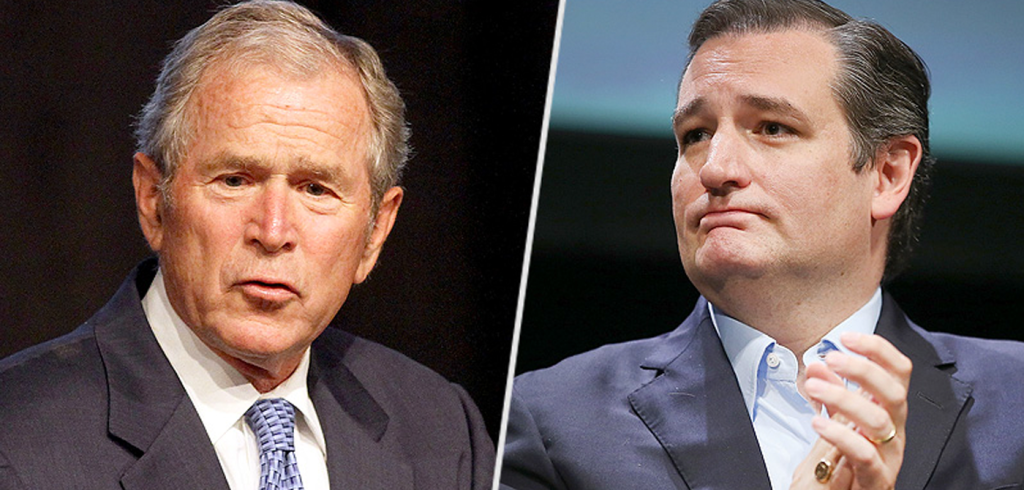
Ted Cruz once proudly wore a belt buckle borrowed from George H.W. Bush that said: “President of the United States.” He campaigned and worked for that former president’s son, Dubya, former President George W. Bush. And Cruz helped write a book lavishing praise on him. Also, the endorsement of George P. Bush, the family’s latest rising political star and son of Jeb Bush, lent credibility to Cruz’s then little-known 2012 Senate campaign. Now, though, things aren’t so simpatico between the Bushes and Cruz – and not only because one of the Texas senator’s GOP presidential primary competitors is Jeb Bush, the former governor of Florida. Rising tensions reflect Cruz potentially helping to dent the Bushes’ position as one of the nation’s pre-eminent political families, personifying a deeper internal Republican Party struggle between insurgent conservative outsiders and the old guard establishment. “There is this question of, ‘When are the adults going to come in and change the race?’ I think the adults are at the table. I certainly consider myself one,” said Mica Mosbacher, a prominent Cruz fundraiser whose late husband, Robert, was secretary of commerce under George H.W. Bush. “Some people are still in denial.” Cruz supporters point to October, when George W. Bush said of Cruz to a roomful of donors: “I just don’t like that guy.” “I think it hurt him,” Mosbacher said of the former president. “He failed to have his finger on the pulse.” Ray Sullivan, who was national spokesman for George W. Bush’s 2000 campaign, said the comment “underscores a highly competitive, multicandidate race and different segments of the Republican Party.” But he also conceded that it was somewhat unusual for George W. Bush to openly criticize a fellow Republican. “The Bushes are a competitive lot,” said Sullivan, who ran a PAC backing Rick Perry’s short-lived 2016 presidential bid before jumping to Jeb Bush‘s campaign in September. “I viewed that as almost a game-day, rally-the-troops commentary.” Cruz hasn’t retaliated, but being criticized by George W. Bush delighted his tea party base. Since then, Cruz’s candidacy has risen in the polls, while Jeb Bush’s bid has struggled. Clay Johnson III, a friend of George W. Bush since high school and former top budget official in his administration, said he recently spent time with the former president and they discussed how many of the crowded field of GOP White House hopefuls “have no idea at all about what’s involved in being president.” Still, that public display of bad blood in Bush’s comment to donors was a far cry from Bush’s 2000 presidential campaign, when Cruz was a domestic policy adviser. Cruz later held jobs in the Bush administration in the Justice Department and Federal Trade Commission and, on the verge of the 2004 Republican National Convention, wrote a chapter in “Thank You, President Bush,” a book meant to answer “Bush-haters.” In it, Cruz likened George W. Bush to Abraham Lincoln and Ronald Reagan and wrote that some fiscal conservatives decried Bush for increased government spending, but “those concerns are often overstated.” In his own autobiography published last year, however, Cruz made it clear his views had changed, criticizing Bush for excessive federal spending. Also in his book, Cruz recalled borrowing jeans, a shirt and that belt buckle from George H.W. Bush for a 2009 sailing outing, writing that “it was surreal to be wearing his clothes.” Before his 2012 Senate bid, Cruz explored running for Texas attorney general. In the autobiography, he detailed how, after the sailing trip, George H.W. Bush agreed to endorse that campaign. But Cruz wrote that Karl Rove, a top strategist for George W. Bush, pressured him not to publicize that. Rove disputed the book’s assertion last summer, prompting the Cruz campaign to release 2009 emails from Rove that it said backed up Cruz’s account. Cruz wrote that George H.W. Bush had wanted to call him “the future of the Republican Party.” Three years later, Bush’s grandson, George P., used those same words to praise Cruz during his Senate run. In a 2012 statement backing Cruz, who was then an underdog in Texas’ Republican primary, George P. Bush saluted him and another now presidential hopeful, Marco Rubio, saying both “will inspire a new generation of leaders to stand up and defend American Exceptionalism.” George P. Bush, Jeb’s eldest son, was elected Texas land commissioner in 2014. Through his office, George P. Bush declined to comment for this story, but he has said he still considers Cruz a friend – even if he’s now campaigning for his dad. Brendan Steinhauser, a GOP strategist who is uncommitted in the presidential race, called the falling out between Cruz and the Bushes “a good example of the battle for the heart and soul” of the Republican Party. “There may be frustration on the Bush side that this isn’t the party from 2000 to 2008, and certainly not before that under Bush senior,” Steinhauser said. “The tea party, the rise of the grassroots … that started during the younger Bush’s presidency.” Republished with permission of the Associated Press
GOP candidate Ben Carson threatens to leave Republican Party

In what would be a nightmare scenario for the GOP, presidential candidate Ben Carson threatened Friday to leave the Republican Party amid reports of deepening concerns from GOP officials about the splintered 2016 electorate. The retired neurosurgeon lashed out at Republican leaders who discussed the possibility of a “brokered convention” during a recent private dinner in Washington. The Washington Post first reported Thursday that the group, including Republican National Committee chairman Reince Priebus and Senate Majority Leader Mitch McConnell, addressed the sustained strength of billionaire businessman Donald Trump and the possibility that a consensus nominee might not emerge before the party’s mid-July national convention in Cleveland. “If this was the beginning of a plan to subvert the will of the voters and replace it with the will of the political elite, I assure you Donald Trump will not be the only one leaving the party,” Carson said in a statement that referenced Trump’s repeated threats to leave the GOP if treated “unfairly.” “I pray that the report in the Post this morning was incorrect,” Carson added. “If it is correct, every voter who is standing for change must know they are being betrayed. I won’t stand for it.” Republished with permission of the Associated Press.


